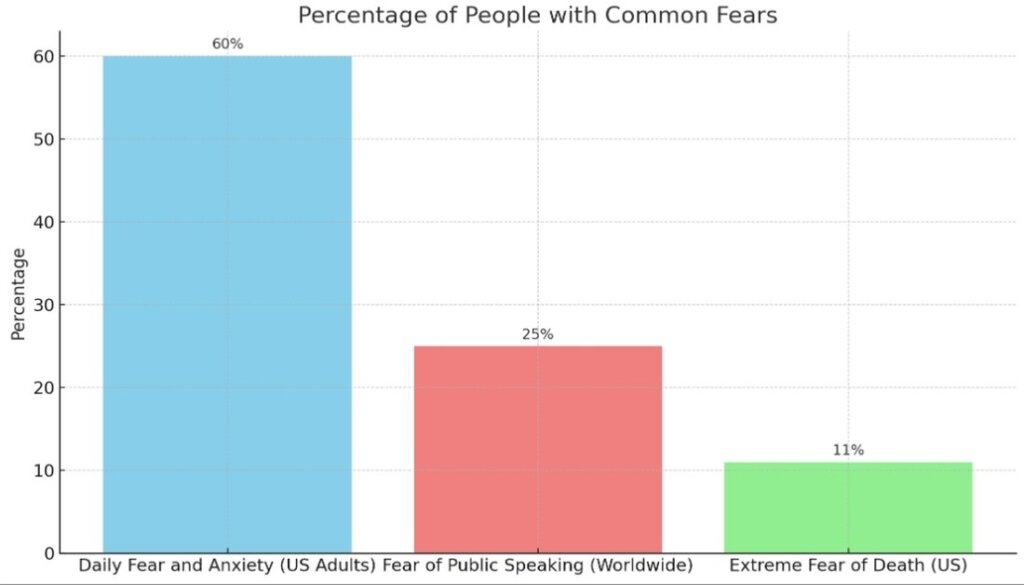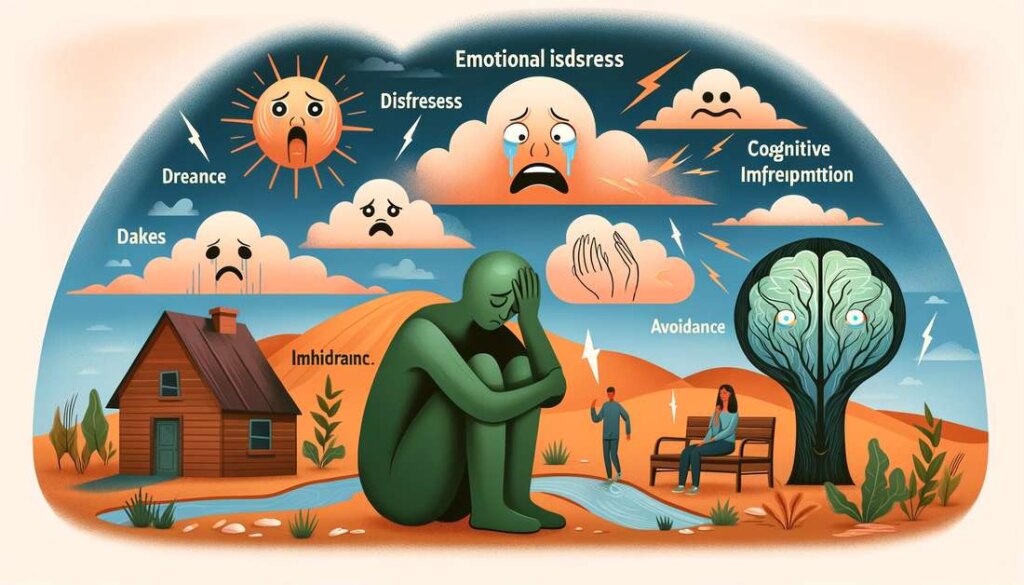How to Overcome Fear: Did you know that 60% of adults in the U.S. report feeling daily fear and anxiety? Fear is something everyone experiences at some point in their lives. It can be a small worry or a big anxiety that takes over your mind.
Fear can stop you from doing the things you love and make you feel stuck. Around 25% of people worldwide are afraid of public speaking, making it one of the most common fears. Additionally, about 11% of Americans have an extreme fear of death.
This chart helps us understand the relative frequency of these fears, with daily anxiety being the most common among the surveyed groups.

But what if there was a simple way to help manage fear? In this post, we will explore how meditation can help overcome fear. Meditation is a powerful tool that can bring calm and peace to your mind. Let’s dive into how it works and why it’s effective.
Key Takeaways
1. Meditation reduces fear-related stress and anxiety.
2. Increases self-awareness to identify and manage fear triggers.
3. Fosters emotional stability and resilience against fear.
4. Enhances focus and concentration, minimizing fear distractions.
5. Scientific evidence supports meditation’s effectiveness in reducing fear.
[How to Overcome Fear]
Understanding Fear

Fear is a natural emotion that helps us stay safe. It warns us when something might be dangerous. But sometimes, fear can become overwhelming.
It can take over your thoughts and make everyday activities difficult. Fear can show up in many ways, like a fast heartbeat, sweating, or feeling dizzy. It can also make you worry a lot or avoid certain places or people.
Understanding how fear affects you is the first step in learning how to manage it.
Impact of Fear
Physical Health Consequences

Fear can have a big impact on your physical health. When you feel scared, your body reacts. Your heart might beat faster, and you might start to sweat.
This is your body’s way of preparing to deal with danger. But if you feel this way all the time, it can be bad for your health. Chronic fear can lead to stress and anxiety disorders.
These conditions can make you feel tired and restless. They can also weaken your immune system, making it harder for your body to fight off illnesses. Long-term fear can also cause heart problems. [How to Overcome Fear]
It can raise your blood pressure and increase the risk of heart disease. Fear can also affect your sleep. You might find it hard to fall asleep or stay asleep.
This lack of sleep can lead to other health problems, like headaches and poor concentration. Fear can even make chronic pain worse. If you have a condition like arthritis, feeling scared or stressed can increase your pain levels.
Mental Health Effects

Fear doesn’t just affect your body. It also impacts your mind. When you feel scared, you might also feel sad or hopeless.
This emotional distress can lead to depression. Fear can also make it hard to think clearly. You might have trouble concentrating or making decisions.
This cognitive impairment can affect your daily life. It can make it hard to work or study. Fear can also lead to behavioral changes.
You might start avoiding situations that make you feel scared. This avoidance can reduce your quality of life. You might miss out on fun activities or important opportunities.
Some people develop phobias, which are intense, irrational fears of specific things or situations. Others might experience panic disorders, where they have sudden, intense episodes of fear called panic attacks. Fear can also affect your self-esteem. [How to Overcome Fear]
When you feel scared, you might start to doubt yourself. You might think you’re not good enough or that you can’t handle certain situations. This can make you feel less confident and more anxious.
Social Impact

Fear can also affect your relationships with other people. When you feel scared, you might act differently around others. This can put a strain on your relationships.
You might avoid spending time with friends or family because you feel anxious. This isolation can make you feel lonely and disconnected. Fear can also affect your work and productivity.
You might find it hard to focus on tasks. You might feel too anxious to perform well at your job. This can affect your career progression and lead to job loss.
Fear can also create communication barriers. When you’re scared, it can be hard to express yourself clearly. This can make it difficult to have meaningful conversations with others.
You might also have trust issues. Fear can make it hard to trust other people. You might worry that they will hurt or disappoint you. This can make it hard to form close relationships.
Behavioral Consequences

[How to Overcome Fear]
Fear can lead to changes in your behavior. You might start avoiding things that make you feel scared. This avoidance behavior can limit your life.
You might miss out on fun activities or important opportunities. Fear can also make you risk-averse. You might be reluctant to try new things or take risks.
This can limit your personal and professional growth. Some people might develop compulsive actions. They might engage in repetitive behaviors to try to control their fear.
This can include things like checking the locks on doors multiple times. Fear can also lead to substance abuse. Some people might turn to drugs or alcohol to cope with their fear.
This can lead to addiction and other serious problems. Fear can also dictate your daily choices. You might make decisions based on what will make you feel safe, rather than what you really want to do. This can restrict your life and limit your experiences.
Financial Impact

Fear can also have a financial impact. When you feel scared, you might need more medical care. This can increase your healthcare costs. [How to Overcome Fear]
You might need to see a doctor more often or take medication. Fear can also affect your job. You might find it hard to focus or perform well at work.
This can lead to job loss or missed opportunities for promotions. Fear can also affect your productivity. You might find it hard to get things done or meet deadlines.
This can affect your income and career progression. Fear can also lead to financial strain. You might have increased medical bills or reduced income. This can lead to debt accumulation and financial stress.
Meditation as a Solution
Calming the Mind

Meditation can help calm your mind. When you meditate, you focus on your breath and let go of distracting thoughts. This can help reduce immediate stress and anxiety.
Meditation promotes relaxation and peace. It creates a mental space for calm and clarity. By interrupting the cycle of fearful thoughts, meditation provides a sense of control over your mental state.
You can learn to let go of worries and focus on the present moment. This can make you feel more relaxed and less anxious. For example, a simple breathing exercise can help you calm down quickly. [How to Overcome Fear]
Sit in a comfortable position, close your eyes, and take deep breaths. Inhale slowly through your nose, hold your breath for a few seconds, and exhale slowly through your mouth. Repeat this for a few minutes.
This practice can help slow your heart rate and clear your mind. Over time, regular meditation can help you stay calm in stressful situations. You can practice meditation anywhere, at any time. Even a few minutes a day can make a big difference in how you feel.
Increasing Awareness

Meditation can also increase your awareness. When you meditate, you become more aware of your thoughts and feelings. This self-awareness can help you recognize and manage fear triggers.
You can develop a deeper understanding of your thought patterns and emotional responses. By observing fear without judgment, you can gain insight into the root causes of your fear. This can help you learn to respond rather than react to fear.
You can make more thoughtful decisions and feel more in control of your emotions. For example, mindfulness meditation can help you become more aware of your present moment experiences. [How to Overcome Fear]
Sit in a comfortable position and focus on your breath. Notice the sensation of your breath as it moves in and out of your body. If your mind starts to wander, gently bring your attention back to your breath.
This practice can help you become more aware of your thoughts and feelings without getting caught up in them. Over time, mindfulness meditation can help you develop a greater sense of clarity and self-awareness.
This can make it easier to recognize and manage fear triggers.
Fostering Emotional Balance

Meditation can foster emotional balance. Regular meditation practice can help build resilience and emotional stability. You can learn techniques for maintaining calm and balance in stressful situations.
Meditation can help cultivate a positive mindset. It can reduce emotional reactivity and strengthen your ability to handle negative emotions. This can make you feel more balanced and in control of your emotions.
After a few minutes, shift your focus to yourself and repeat the same phrases. This practice can help you develop a sense of kindness and compassion for yourself and others. Over time, loving-kindness meditation can help you feel more connected and emotionally balanced.
[How to Overcome Fear]
You can also practice meditation techniques that focus on gratitude and positive thinking. This can help you develop a more positive outlook on life and reduce negative emotions.
Enhancing Focus and Concentration

Meditation can also enhance your focus and concentration. When you meditate, you practice focusing your attention. This can improve your ability to concentrate on tasks.
Techniques for maintaining concentration during stressful situations can help you stay focused and calm. Meditation can also improve cognitive function.
A focused mind can reduce fear-related distractions. By incorporating meditation into your daily routine, you can enhance your focus and productivity. For example, concentration meditation can help you improve your focus.
Sit in a comfortable position and choose an object to focus on, like a candle flame or a picture. Keep your attention on the object and notice the details.
If your mind starts to wander, gently bring your attention back to the object. This practice can help you develop greater focus and concentration. Over time, concentration meditation can help you stay focused and calm in stressful situations.
You can also practice meditation techniques that involve visualization and mental imagery. This can help you develop a clear and focused mind. [How to Overcome Fear]
Scientific Evidence

There is scientific evidence that supports the benefits of meditation. Studies show that meditation can alter brain structures associated with fear and anxiety.
Meditation can influence cortisol levels and reduce stress hormones. Research shows that meditation has a sustained impact on mental health and well-being.
It promotes brain flexibility and adaptation, also known as neuroplasticity. Meditation can also improve immune function and overall health.
This scientific evidence supports the idea that meditation can help
manage fear and improve your overall well-being. For example, research shows that meditation can reduce the size of the amygdala, the part of the brain responsible for fear and anxiety.
This can help reduce the intensity of fear responses. Meditation can also increase the thickness of the prefrontal cortex, the part of the brain responsible for decision-making and self-control.
This can help improve your ability to manage fear and make thoughtful decisions. Studies also show that meditation can reduce cortisol levels, the hormone associated with stress.
This can help reduce feelings of anxiety and improve your overall well-being. Research also shows that meditation can improve immune function and increase the production of antibodies.
[How to Overcome Fear]
This can help your body fight off illnesses and improve your overall health. These scientific findings support the idea that meditation can be an effective tool for managing fear and improving your mental and physical health.
Samarpan Meditation
Friends, now many of you must be wondering that we have understood how meditation helps us to control our fear, but there are many meditation methods prevalent in the society. So which meditation method should we meditate with so that we can control our fear?
So friends, here I would like to suggest to you the Samarpan Meditation method because I myself have been meditating with this method for the last 15 years and I have got positive experiences in my life. On the basis of my 15 years of experience, I am suggesting you this meditation method.
This meditation method is taught free of cost all over the world. There are no strict rules in this meditation method and it is a very simple and easy meditation method.
Although there are many other meditation methods in society, I do not know about them nor do I have any experience of them. Therefore, I do not consider it appropriate to suggest them or talk about them.
Conclusion [How to Overcome Fear]
So friends, I hope you have understood through this blog post how you can overcome your fear through meditation. If you liked this blog post of mine, then I request you to read my other blog posts as well. In them, I have discussed in detail about the various benefits of meditation, which can be very useful for you.
If you have any questions regarding this blog post, please ask in the comment box. I will definitely try to answer your questions.
In the end, I would just like to say to you that meditation can be a powerful tool that can help manage fear. It can calm your mind, increase your awareness, encourage emotional balance, increase your focus and there is also scientific evidence of its benefits.
By incorporating meditation into your daily routine, you can feel more in control of your emotions and be less affected by fear. Try meditation and see how it can benefit your life. Thank you
To read my other blogs: Click here